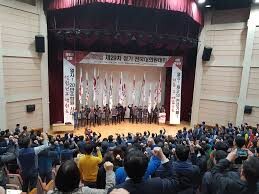hankyoreh
Links to other country sites 다른 나라 사이트 링크
Korean Government Employees’ Union regains legal status after nine years

The Korean Government Employees' Union (KGEU) became a “legal union” for the first time in its nine-year history with an amendment to its regulations on dismissed workers. Recognition for the union, which is affiliated with the Korean Confederation of Trade Unions (KCTU), came with its sixth establish notice since 2009.
The Ministry of Employment and Labor (MOEL) announced that it had granted an establishment accreditation on Mar. 29 after reviewing the union establishment notice submitted on Mar. 26. With that decision, the KGEU becomes a lawful union according to the Act on the Establishment and Operation of Public Officials’ Unions, winning legal protections including the conclusion of collective agreements through collective bargaining and guarantees on full-time unionist activities.
The reason the government had refused to give the KGEU accreditation as a union was because of a rule about terminated employees. The current Act on Public-Sector Labor Unions does not allow terminated employees to enroll in unions. But the KGEU’s rules empower its central executive committee to keep fired employees on the rolls if they were terminated unfairly or are contesting the validity of their termination.
The Ministry of Employment and Labor has rejected the union’s application for establishment because it regards this rule as violating the Act on Public-Sector Labor Unions, and the courts have ruled that the Ministry’s rejection was lawful. During an assembly of delegates on Mar. 24, the KGEU revised the rule about terminated employees’ membership in the union, with 77% voting in favor of the revision.
Since the current Act on Public-Sector Labor Unions prevents terminated employees from enrolling in unions and does not guarantee collective action, it has received considerable criticism from the international community on the grounds that it violates the freedom of association. Labor activists in South Korea have also called for the abolition of the act in order to fully guarantee the three rights of labor for government employees.
Factors in the KGEU’s decision to revise its rules under these circumstances appears to have been the pressure of having no legal recognition for so long and the fact that other public-sector unions, including the Confederation of Korean Government Employees’ Unions, do have that recognition.
“We ended up revising our rules because the government is holding to its position that it cannot give us legal recognition given the decisions reached by courts during the administrations of Lee Myung-bak and Park Geun-hye. Our position of support for the abolition of the Act on Public-Sector Labor Unions remains unchanged,” said a KGEU spokesperson.
The Korean Teachers and Education Workers Union (KTU), which lost its legal accreditation during the Park administration because of the membership of terminated employees just like the KGEU announced that it “does not intend to gain legal recognition by revising its rules.”
“Rather than passing the responsibility for legalization to the KTU, the government ought to hurry up and revise the law to guarantee the three rights of labor for all teaching staff and public servants,” said a KTU spokesperson.
By Park Tae-woo, staff reporter
Please direct questions or comments to [english@hani.co.kr]

Editorial・opinion
![[Editorial] Does Yoon think the Korean public is wrong? [Editorial] Does Yoon think the Korean public is wrong?](https://flexible.img.hani.co.kr/flexible/normal/500/300/imgdb/original/2024/0417/8517133419684774.jpg) [Editorial] Does Yoon think the Korean public is wrong?
[Editorial] Does Yoon think the Korean public is wrong?![[Editorial] As it bolsters its alliance with US, Japan must be accountable for past [Editorial] As it bolsters its alliance with US, Japan must be accountable for past](https://flexible.img.hani.co.kr/flexible/normal/500/300/imgdb/original/2024/0417/6817133413968321.jpg) [Editorial] As it bolsters its alliance with US, Japan must be accountable for past
[Editorial] As it bolsters its alliance with US, Japan must be accountable for past- [Guest essay] Amending the Constitution is Yoon’s key to leaving office in public’s good graces
- [Editorial] 10 years on, lessons of Sewol tragedy must never be forgotten
- [Column] A death blow to Korea’s prosecutor politics
- [Correspondent’s column] The US and the end of Japanese pacifism
- [Guest essay] How Korea turned its trainee doctors into monsters
- [Guest essay] As someone who helped forge Seoul-Moscow ties, their status today troubles me
- [Editorial] Koreans sent a loud and clear message to Yoon
- [Column] In Korea’s midterm elections, it’s time for accountability
Most viewed articles
- 1[Column] The clock is ticking for Korea’s first lady
- 2Samsung barricades office as unionized workers strike for better conditions
- 3[Editorial] When the choice is kids or career, Korea will never overcome birth rate woes
- 4[News analysis] After elections, prosecutorial reform will likely make legislative agenda
- 5S. Korea, Japan reaffirm commitment to strengthening trilateral ties with US
- 6Why Israel isn’t hitting Iran with immediate retaliation
- 7[Guest essay] How Korea turned its trainee doctors into monsters
- 8Japan officially says compensation of Korean forced laborers isn’t its responsibility
- 9[Editorial] Does Yoon think the Korean public is wrong?
- 10[Editorial] 10 years on, lessons of Sewol tragedy must never be forgotten